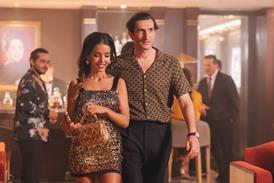Nikkatsu's legendary film studios in Chofu City, a suburb of Tokyo: a set of a weatherbeaten beach house stands in the centre of the studio as gaffers and set dressers work away. Artificial moonlight bleeds through slats in the structure's opaque roof, illuminating decrepit furniture and marine equipment inside.
Once adjustments are complete, director Kiyoshi Kurosawa quietly surveys the conditions for an upcoming scene with actors Koji Yakusho and Kyoko Koizumi. It is an unusual sight, as Kurosawa generally shoots on location.
'This set was built for one day only. As a film fan it's an undeniably exciting place to be, but there's a lot of pressure,' says the director, who appears affable and relaxed.
The actors arrive on set without fuss and have their wardrobe checked as Kurosawa takes his place next to cinematographer Akiko Ashizawa, one of the Japanese industry's few female DoPs. They rehearse the scene, the dialogue almost at a whisper until an unexpected burst of emotion. On the video-assist monitor the visuals are positively menacing, as if it were a Kurosawa horror film. But with Tokyo Sonata, the versatile director, well known for J-horror titles Retribution and Pulse, as well as festival favourites Brighter Future and Charisma, has traded fears of death and the unknown for the insecurities and secrets of an average Japanese family.
Based on a screenplay by Australian Max Mannix, subsequently translated into Japanese for Kurosawa, Tokyo Sonata explores how a man's job continues to define his worth and place in modern Japan despite the country's rapidly changing culture. Actor Teruyuki Kagawa, best known for Sukiyaki Western Django and Sway, plays an ordinary 'salaryman' who finds himself unemployed but hides the fact from his family out of shame. His wife, played by Koizumi, whose credits include Nada Soso, struggles with her role as homemaker. Their elder, alienated son is played by rising talent Yu Koyanagi, who made his mark in Crows Zero, while Kai Inowaki plays their younger son.
'I start from a point of lies, suspicion and a complete breakdown of communication within the family,' says Kurosawa.
Tokyo Sonata was launched at last year's Hong Kong Asia Film Financing Forum (HAF). Fortissimo Films, which originally optioned Mannix's screenplay through CAA, partnered with Japanese producer and financier Entertainment Farm (EF), which was previously involved with Kurosawa's horror opus Retribution.
While Fortissimo has a well-established track record of investing in and selling Asian films, Tokyo Sonata represents the company's first foray into Japanese-language production. 'It appealed to us because it was a poignant and universal story as well as an insightful commentary on modern Japan,' explains Fortissimo founder Wouter Barendrecht.
Established in 2002, EF has invested in diverse projects such as Mira Nair's The Namesake, Ethan Hawke's The Hottest State and J-horror titles including Takashi Shimizu's Reincarnation as well as Retribution.
Tokyo Sonata producer and EF's international division managing director Yukie Kito learned the ropes under producer Takashige Ichise, whose credits include The Ring and The Grudge and is one of Japan's few successful producers working equally in Hollywood and at home. 'We're a Japanese company based in Japan but we have a vision toward the worldwide market,' says Kito.
EF represents the kind of company with which Fortissimo wants to be in business. 'We had known Yukie Kito for some time, and both sides had expressed interest in working together,' says Barendrecht. 'We felt this would be a perfect opportunity and thus approached her with the script.'
It is the first time Kurosawa has worked from a foreign writer's screenplay, still a rarity in the Japanese industry. He says the story resonated with him, and he did considerable rewrites, including the creation of a supporting character for longtime collaborator Yakusho to play. With eight films under their belts and an osmosis-like communication on set, the pair draw comparisons with Scorsese and De Niro.
But it is David Cronenberg who Kito suggests as comparable with Kurosawa. Both directors have created their share of disturbing visions but also work in other genres, with a keen sense of human relationships. Kurosawa has previously demonstrated his talents in non-horror projects such as License To Live, Charisma and Bright Future, all of which have the same quiet intensity of his horror work.
It is hoped Tokyo Sonata will snag a Cannes spot later this year. Kurosawa's Bright Future competed for the Palme d'Or in 2003, while Pulse screened in Un Certain Regard in 2001, winning the Critics' Prize. It was also remade in English by The Weinstein Company, earning $29.7m worldwide.
EF and Fortissimo hope to continue their joint relationship with Kurosawa, with Kito aspiring to produce an action film set in San Francisco as the director's first English-language project.
Fortissimo is screening a trailer of Tokyo Sonata at next month's European Film Market at the Berlinale.

















No comments yet